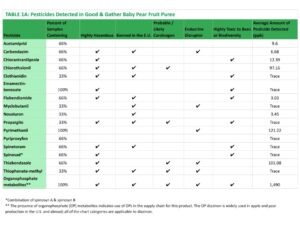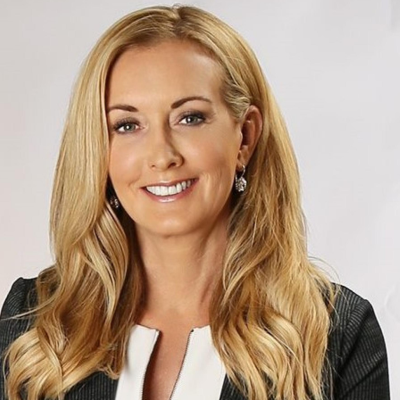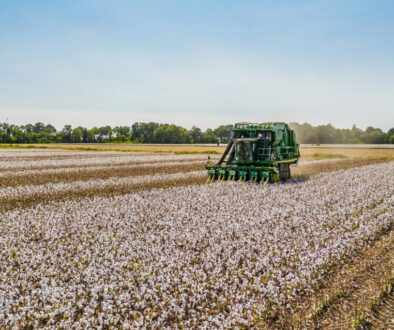Baby food fears: Are pesticides and other contaminants posing threats to children?
From botulism spores in infant formula to arsenic and insecticides in baby food, concerns are swirling over contamination in foods marketed as essential nutrition for young children.
A US recall of infant formula tied to multiple cases of babies sickened with botulism has sparked fears in households around the country in recent weeks. But health and legal experts say other types of contaminants such as heavy metals and pesticides could be posing additional threats.
An analysis unveiled Tuesday by the public health watchdog Friends of the Earth said more than two dozen types of pesticides have been detected in “Good & Gather” baby food made and sold by Target. The analysis is the latest among many testing projects conducted in recent years showing the prevalence of pesticide residues in foods commonly fed to children and generally considered healthy.
The group said it found residues of 29 pesticides in Apple Fruit Puree and Pear Fruit Puree baby food, including 16 pesticides that are classified as “highly hazardous” to human or environmental health.
Ten of the pesticides detected are banned in the European Union, the report found, and eight are linked to hormone disruption, posing potential risks to brain development and a child’s immune system. Six of the pesticides found in the baby food are classified as “probable” or “likely” carcinogens by the US Environmental Protection Agency (EPA), according to the report.
A class of insecticides known as neonicotinoid, or neonics, were detected in the majority of the baby food samples tested, the researchers said. Neonicotinoids have been linked to birth defects of the heart and brain, autism spectrum disorder, damage to the nervous system, and hormone disruption.
“It’s alarming to see so many toxic pesticides in food intended for babies because they are so vulnerable,” said Kendra Klein, deputy director of science at Friends of the Earth. “Their bodies and brains are in critical stages of development, so even small exposures to toxic pesticides can have lifelong impacts, increasing the risk of learning disabilities, certain cancers, and even obesity in the case of pesticides that disrupt our hormones.”
 Friends of the Earth tested six samples – three of the pear fruit puree and three of the apple fruit purée – with each from different lots, Klein said. The samples were purchased from Target stores in California and Delaware in August 2025.
Friends of the Earth tested six samples – three of the pear fruit puree and three of the apple fruit purée – with each from different lots, Klein said. The samples were purchased from Target stores in California and Delaware in August 2025.
“If pesticide use wasn’t extensive in Target’s supply chain, you’d expect that some of those samples would come back clean,” she said. “But we found pesticides in every sample we tested. So, although this is a small set, what it indicates is widespread use of toxic pesticides in these baby food supply chains.”
Friends of the Earth and more than 40 other environmental and public health organizations have been pushing Target to address pesticide use in its supply chain.
Target did not respond to a request for comment. But on its website, the retailer states that it has been encouraging suppliers to “limit non-essential use of pesticides,” and phase out the use of neonics.
Despite those efforts, Friends of the Earth said the results this year show more pesticide presence in the Target foods than similar testing showed last year, with 29 pesticides detected versus 21 a year ago. As well, the group said 16 of those detected this year were highly hazardous compared to 12 a year ago, this year’s testing found 10 pesticides banned in the EU compared to 8 a year ago.
A larger study two years ago by the Environmental Working Group found 38 percent of 73 baby food products contained pesticide residues.
Scientists disagree on whether or not regular consumption of low levels of pesticide residues harm children, with many saying more research is needed to explore the impacts of the contamination. A research review published last year by scientists from Ghana cited pesticide residues in food as a “significant concern” because of the risk of adverse health impacts, and said there is a “need for more comprehensive and standardized research to fully understand the implications of pesticide residues on human health.” The researchers said their review pinpointed “numerous adverse health consequences linked to exposure to these residues, including neurotoxicity, disruption of the endocrine system, reproductive issues, and heightened cancer risks.”
Lawsuits over heavy metals
In addition to pesticide residues, there are growing concerns about heavy metal contaminants in baby food.
Hundreds of US families are currently suing several major baby food makers alleging they have knowingly been selling baby foods containing high levels of lead, arsenic, cadmium and mercury – heavy metals known to have harmful health impacts on children through certain exposures.
A key five-day-long hearing is set for the week of Dec. 8 in federal court in California to evaluate expert scientific witness testimony as the cases move closer to trial.
The litigation alleges that the food companies involved knew their products contained toxic heavy metals that are linked to brain damage and other neurodevelopmental harm in children but sold them anyway without warning, taking advantage of a lack of regulations governing such contaminants in baby food. The children represented in the litigation have suffered a range of injuries, including diagnoses of autism spectrum disorder (ASD), and or attention deficit hyperactivity disorder (ADHD), according to the master legal complaint.
“The consequences are stark— there is an unprecedented epidemic of ASD and ADHD spreading throughout the American population, driven, in part, by the systematic neurodevelopmental poisoning of infants from these Defendants’ Contaminated Baby Foods,” the legal complaint states.
The litigation was largely spurred by revelations from a 2019 study by a consumer advocacy group and a subsequent 2021 inquiry by federal lawmakers that obtained internal company documents and test results confirming that commercial baby foods were being tainted with significant levels of the toxic heavy metals.
Several companies were recently dismissed as defendants. The remaining defendants include Gerber, Nurture, Hain, Sprout, Beech-Nut, Campbell’s Co. and its former subsidiary Plum, and Walmart, which sells private label baby foods branded Parent’s Choice, and others.
The companies argue there is no reliable scientific evidence showing that consumption of their foods can cause autism or ADHD. They say that the baby food products at issue are made of “fruits, vegetables, and grains that are widely recognized as essential to healthy neurodevelopment.”
Food “like Defendants’ baby food is known to be good (in fact, essential) for children’s developing brains,” the companies state in a recent court filing.
Pediatrician Michelle Perro said while there is little data on what types of synergistic effects could be produced through combinations of chemicals such as pesticides and heavy metals when consumed by babies and children, the lack of data does not translate to a lack of reason for concern.
FDA taking action
The Food & Drug Administration (FDA) has said it is developing new testing methods to measure lower levels of contaminants in foods, establishing action levels, and increasing enforcement and monitoring. In January, the agency set action levels for lead in processed foods for babies and children at 10 parts per billion (ppb) for fruits and vegetables, yogurts, and other foods, and 20 ppb for dry infant cereals.
But the agency also says that reducing the food contaminants is “complicated.”
“It is crucial to ensure that measures taken to limit arsenic, lead, cadmium, and mercury in foods do not have unintended consequences—like eliminating from the marketplace foods that have significant nutritional benefits or reducing the presence of one element while increasing another,” the agency states on its website.
In September, Sprout Organics recalled Sweet Potato, Apple & Spinach food pouches for potentially elevated lead levels, and earlier this year a recall was also issued for some Target “Good & Gather” products due to elevated lead levels.
When asked about the questions raised about pesticides and heavy metals in baby foods, nutrition policy expert Marion Nestle said that more information is needed about the prevalence and levels of contamination in food for children to know what level of concern is warranted, but stressed that producers of food for babies should be doing everything possible to ensure product safety.
Featured image: Getty Images/Unsplash +.




